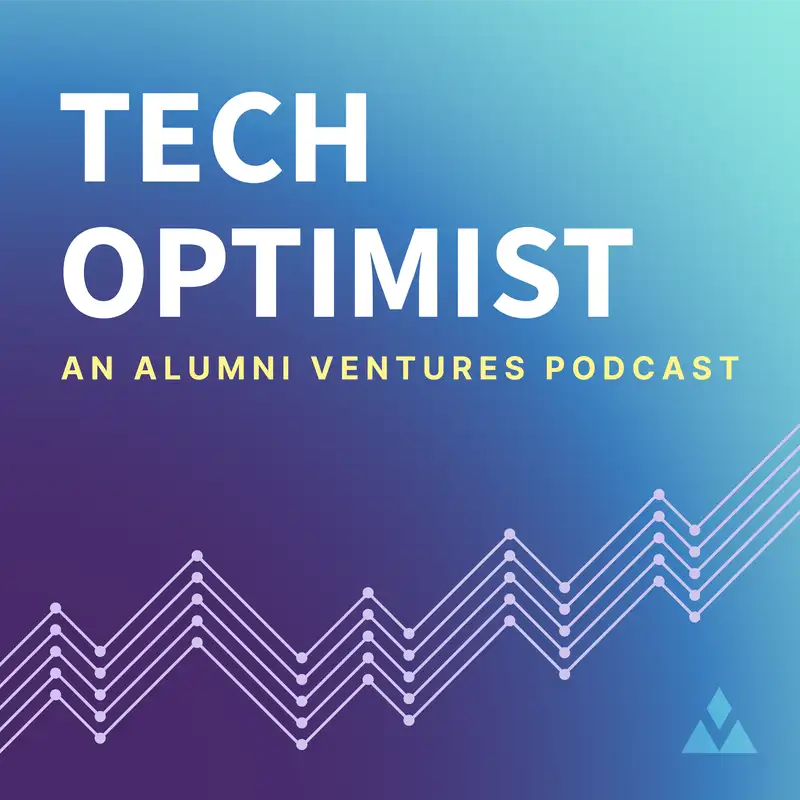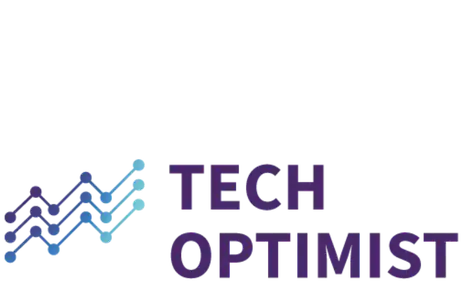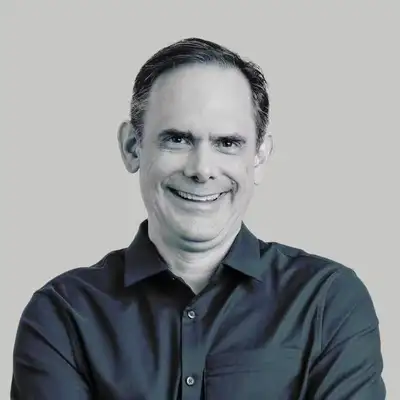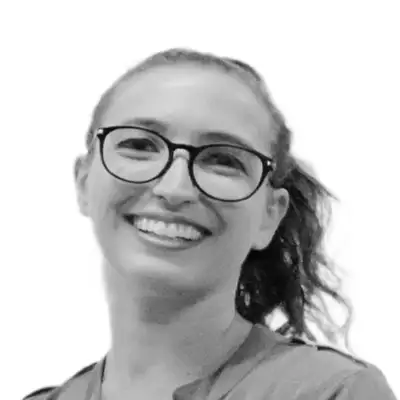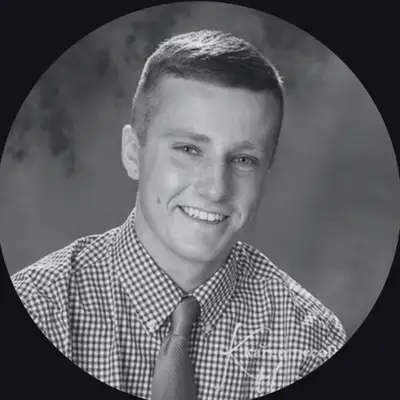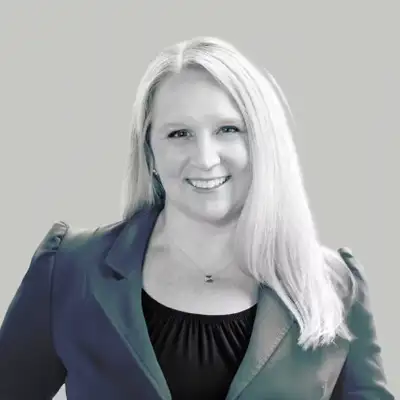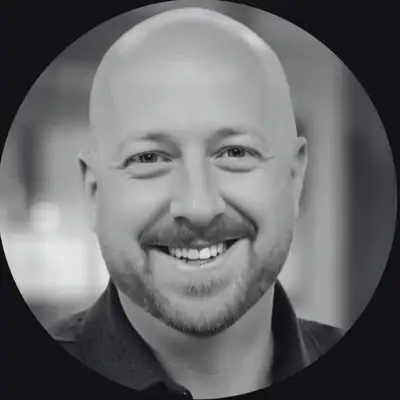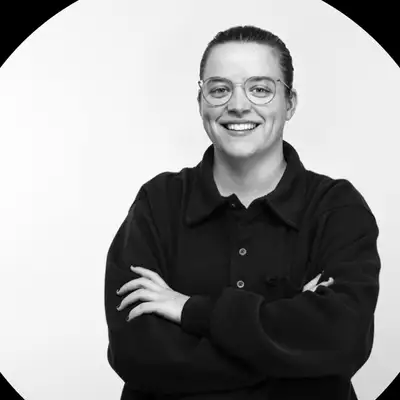#79 - Meet the Startup Making Analytics Effortless With AI
Samantha Herrick:
This is a podcast brought to you by Alumni Ventures. Welcome to the Tech Optimist. Here, we don't just talk about technology, we celebrate it. This is a show where bold ideas meet big innovations, and dreamers shaping our future takes center stage. Buckle up, and get ready to explore a world where tech meets optimism, and where the future is always bright. Let's get started.
Daphne Pariser:
We would spend 20% of our workday really trying to actually get all of the data together, make reports, stuff like that.
Samantha Herrick:
That is Daphne Pariser, Co-Founder and CEO of HeronAI.
Daphne Pariser:
And so I automated that system and that's what we turned into HeronAI today.
Chris Sklarin:
Right, right. I was going to say, versus not doing it with any kind of software at all, it seems like it must be days and days versus minutes, right? It's just crazy. Or months.
Daphne Pariser:
Yeah, weeks to months, yeah.
Samantha Herrick:
And that is Chris Sklarin, managing partner at Alumni Ventures. So as we've seen and as we've just talked about, data analytics isn't just about the numbers. It's about turning insights into action, whether it's predictive, customer, operational, financial market, or product analytics, these approaches empower businesses to grow, adapt, and thrive in an ever-evolving landscape. That's me, the guide for this podcast, Sam Herrick.
Today, we're thrilled to shine the spotlight on HeronAI, a Boston-based startup that's making waves in the world of data analytics, and for good reason. Recently, they took home a staggering $1 million dollar prize at the prestigious 43North pitch competition, but HeronAI has much more than just a winner. They're trailblazers. So, what sets HeronAI apart? Their AI-powered analytics platform is transforming how businesses handle their data. Imagine a system that automatically cleans, processes, and structures your data, saving hours of tedious work. With HeronAI, that's just the beginning.
Here's what's truly revolutionary. They utilize lightning-fast dashboards. So using the latest large language models, HeronAI can analyze data, segment it, and generate an entire dashboard in under five minutes. Natural language interface. Forget complicated coding, users can type simple prompts like, show me quarterly sales trends, and voila, a customized graph and reports appear instantly. An unparalleled compatibility. The platform seamlessly connects to all types of databases, whether they're on the cloud or on the premises, structured, or unstructured. And it's not just speed or simplicity that HeronAI brings to the table. The company claims its software saves businesses a whopping seven hours per person per week, and it runs 16 to 20% faster than its competitors.
HeronAI was co-founded by Daphne Pariser, our guest today. She has an immunology PhD from the Rochester Institute of Technology, and Julien Pinede. Together, they've built a solution that bridges the gap between technical complexity and user accessibility, empowering businesses of all sizes to leverage their data like never before. HeronAI is proving that innovation and impact can go hand in hand. Whether you're a small business or a multinational corporation, they're simplifying the path from data to decisions, one dashboard at a time.
Today we'll be chatting with Daphne, one of Heron's Co-Founders, and to hear more about their journey, their vision, and what's next with the groundbreaking company. Stay tuned. Before we hop into that, we have an ad and a disclaimer. So, hang tight.
Speaker 5:
Attention MIT alum. Are you looking to invest in groundbreaking start-ups? Castor Ventures offers you the rare opportunity to invest in an diversified portfolio built around the vibrant MIT startup ecosystem. With Alumni Ventures, individual investors like you can gain access to venture capital and co-invest alongside leading VC investors. Visit AV.VC/Castor to learn more.
Speaker 6:
As a reminder, the Tech Optimist podcast is for the informational purposes only. It's not personalized advice, and it's not an offer to buy or sell securities. For additional important details, please see the text description accompanying this episode.
Chris Sklarin:
Well, that's a nice segue to our conversation about your entrepreneurial journey. So I want to talk a little bit about that and then get into the HeronAI specifics. But you began the entrepreneurial journey at an amazingly young age, right? You founded your first venture, I think we noted in our diligence report, Humans for Education, just after undergrad, right? At age 23. So what inspired you to take the leap so early into entrepreneurship?
Daphne Pariser:
So I was in Kenya actually when I was 10. I went on a trip on Safari, actually, and when I was there, there was a child that came up to our bus who was banging on the window and asking for food or money. And I, being so young didn't really have an understanding that there was a world that lives like that, and it was really upsetting to me. And so I spent probably the next two weeks on the actual trip crying about it, and it was my Safari tour guide that came over and said, "Pull up your big girl pants. You need to stop crying about this, and if you actually want to make a difference, then do something." I said, "Oh, yeah, that's a good idea."
So I actually went home and I started researching nonprofits and for-profits as every very cool fourth grader does. And I started looking at, where do people actually make money and what is the way to help people in this situation? So I spent many years doing that, and when I was 21 or 22, I actually went back and I spent a few weeks living there and literally just asked people, "If you were to have a magic wand, what would you do?" Basically, and almost everybody was saying that they wanted to build a business. They wanted to create income for their own families, for their schools, for all those sorts of things. So that's how we started Humans for Education. And while I was CEO, we worked with about 100 businesses to grow and scale those businesses. I think we deployed about $800,000 of capital while I was CEO, and the company's still up and running as of today.
Chris Sklarin:
Wow, very cool. And how did that transition to your academics? Because you obviously went on to get a PhD in microbiology, doing a lot in tech, and now you're transitioning here to an AI CEO.
Daphne Pariser:
Well, so I actually, I don't recommend this to anybody, but while I was in my PhD, I started my first business, Humans for Education. Clearly I had so much extra time, that I wanted to-
Chris Sklarin:
[inaudible 00:07:12] on the sides, right?
Daphne Pariser:
Yeah, why not? And so I was getting my PhD at the same time, and so I had already wanted to be in healthcare, but then when I was in my first business, I realized that I really enjoyed the finance aspect of what we were doing, and also the data analytics. So through my PhD, data analytics was the thing that was most exciting to me, and I really wanted to make it simpler. At my first company, we would spend 20% of our workday really trying to actually get all of the data together, make reports, stuff like that. And so I automated that system and that's what we turned into HeronAI today.
Chris Sklarin:
Got it, got it. So how do you feel like your scientific training influenced your leadership at HeronAI?
Daphne Pariser:
Honestly, I think it gave me a lot of rigor, to be honest. Data analytics and being in my PhD was probably the best time of my whole life, which I think maybe not everybody feels the same way. Actually, when I gave my very, very first presentation about my first company, I actually put somebody to sleep in the very back of the audience. I could hear them snoring because all I talked about was data analytics.
Chris Sklarin:
There you go.
Daphne Pariser:
So I think that it gave me a really good way to think about, how do you use data, how do you simplify it, how do you automate it, and how do you make it accessible to people who are non-academics?
Chris Sklarin:
So I guess this would be a good point to have us just take a step back and say, hey, to give us an idea of what HeronAI is. Give us the HeronAI elevator pitch and what sets it apart in the data analytics and AI space.
Daphne Pariser:
Absolutely. So the goal of what HeronAI is trying to do is automate daily decision-making for small, medium-sized businesses. Where basically what we do is we can connect to over 150 data sources, and within less than five minutes, you can generate all sorts of financial reports about how your business is doing and also what you can do to help grow that business.
Samantha Herrick:
All right, so I am here on Heron's website at Heron.ai.com, and I want to read their mission statement and kind of their words on a bit more of what their technology is. So their mission statement, "We redefine the landscape of data analytics to spark a revolution where insights and understanding are not locked behind technical walls, but are accessible to the people who can make a true difference."
Some key features, they have dashboard generation. So in seconds you can get a wide range of high quality graphs that will illustrate your data. Report generation, where you can get detailed reports about your data and obtain insights on your business. An automatic data integration, between your database and you, we handle everything. You have many data sources, let us help you break those silos.
And then they sort of talk about reducing the gap between you as a customer and your data from your business. So, "At Heron, we are convinced that the decision-makers and the domain experts are the ones who can ask the best questions to your data. Our mission, to empower you by delivering those insights directly to your hands." So they have text to dashboard, where their algorithm automatically interprets your natural language prompt with industry specific knowledge, aggregate the relevant data from your database, and use it to create a highly curated graph that best illustrates your business. They have text to business reports, so we don't only generate graphs from natural language prompts, we can deliver in seconds, highly curated business reports based on your data. And they seamlessly connect to other data sources. So, "No database is out of reach for HeronAI. We access the data where it already is so you don't have to worry about it. We can connect to any database whether it is on the cloud or on premises, and we can handle any type of data structured or unstructured."
Chris Sklarin:
Got it. And many founders talk about a pivotal moment in their journey. Was there a defining moment when you sort of knew HeronAI had the potential to be something really big?
Daphne Pariser:
So it's funny because I wasn't sure that I wanted to start a second company, because it's a lot of work. You got to really make sure that you're going to do it, and I took a lot of time to think about it. And what really happened was the product that I developed for my first company, we never commercialized it, but we had over 250 people that wanted to use it. That was the first really good signal. But then the last few months, we really started doing the building work in February of 2024, and from there we went from 250 people to 1,600 people on our waitlist. We were featured by Forbes, we got into Techstars, we just won 43North, we were on Bloomberg. So I don't know that there is one defining moment, but the last six to eight months have been really crazy.
Chris Sklarin:
Right, right, right. Has the vision changed? I mean, from when you first started the company and how's that evolved over the last sort of, I guess, year, year and a half?
Daphne Pariser:
Yeah. I think one of the reasons my CTO and I, my co-founder, Julien, we work so well together is we actually share the exact same personal mission. And I think that this is why when we first met, we met at this bar at MIT, basically. It was kind of just like, oh yeah, this is the person I want to build a business with. And basically, what our vision is, is that we want to create an accessible way to use data so that you can grow your business, and we want to do that for 10 million people in the next few years. And so the vision has not changed, certainly the features have changed a little bit.
Chris Sklarin:
Well, you always add on.
Daphne Pariser:
We've added on, yes. We've swung things away, we've added on. Yeah, we've definitely made some edits, but not to our vision.
Chris Sklarin:
So Heron focuses on using AI to streamline the data analytics for businesses. What makes your approach unique compared to the competitive solutions, or I guess people just doing it by themselves, right? Ad hoc?
Samantha Herrick:
Data analytics plays a crucial role in driving business growth by providing valuable insights and enabling informed decision-making. From understanding customer behavior to optimizing operations, analytics serves as a powerful tool for businesses to stay competitive and innovative. Right now we're going to explore some of the most impactful approaches businesses are using, as highlighted by industry leaders like TechAhead and Sylvon Software.
First, we have predictive analysis using historical data, machine learning, and statistical models. This approach forecasts future outcomes. According to TechAhead, predictive analytics helps businesses anticipate customer behavior, spot market trends, and make data-driven decisions for strategic planning. It's an essential tool for staying ahead in today's fast-paced markets. Next we have customer analytics, which focuses on understanding customer behavior preferences and needs. Sylvon Software emphasizes how businesses can personalize customer experiences, identify key customer segments, and tailor marketing strategies accordingly. By improving customer retention and loyalty, businesses can cultivate lasting relationships with their audiences.
Another critical area is operational analytics. This optimizes business processes and improves efficiency. A report done by Kaizen highlights how businesses can identify bottlenecks in their operations, streamline supply chains, and reduce costs. Operational analytics not only enhances productivity, but also ensures better resource allocation for long-term success.
Now we're going to talk about financial analytics, a game changer for managing costs and optimizing profits. As noted in California Miramar University's insights, businesses can analyze pricing strategies, identify cost-saving opportunities, and even forecast revenue with precision. Financial analytics empowers companies to make strategic financial decisions confidently.
Now we're going to move on to market analytics, which is all about understanding industry trends and competitive landscapes. Kaizen's analysis shows that businesses can use this approach to identify new market opportunities, adapt to changing market conditions, and analyze competitor strategies. Staying informed about the market ensures adaptability and resilience.
Lastly, and finally, we're going to talk about product analysis. So in product analytics, a focus on improving existing products and uncovering new opportunities, TechAhead explains how businesses can track product performance, identify areas for improvement, and innovate based on customer needs. This data-driven approach ensures products remain relevant and valuable to customers.
So as we've seen and as we've just talked about, data analytics isn't just about the numbers, it's about turning insights into action, whether it's predictive, customer, operational, financial, market, or product analytics. These approaches empower businesses to grow, adapt, and thrive in an ever-evolving landscape.
Daphne Pariser:
Yeah. So there are a few things that make us different. One of the things when we started was that we wanted the user experience to be the absolute easiest experience that you could have out there. And so right now we've focused a lot on design and usability, and that's a big piece.
The second piece was speed. So we really wanted you to be able to sit down on the computer, connect your data, analyze the data, and create a visual, as well as an action plan all under five minutes. And today, we're probably about seven minutes, so we're really, really close. But what that actually means is even today we're almost about 20 times faster than the other leading solutions. And then when you compare it to manual processes, we're even more significantly faster than that.
So that was really what was very important to us, and there's a lot more that's coming out in terms of the algorithms that we're using and how we analyze data and how that sets us apart from the others in the field right now.
Chris Sklarin:
Right, right. I was going to say, versus not doing it with any kind of software at all, it seems like it must be days and days versus minutes, right? It's just crazy. Or months.
Daphne Pariser:
Yeah, weeks to months, yeah.
Chris Sklarin:
That's just nuts, right, right. How did you sort of leverage your various backgrounds, you and Julien, to create a product that resonates both with SMBs and with the enterprises? Because I know you've got some customers that are just huge and you've got some folks that are much smaller, smaller shops using this.
Daphne Pariser:
Yeah, it was surprising to us too. So it turns out that the enterprise issue is very similar, where really, they have a lot of data that they collect that they use to make decisions, but ultimately, it actually is in many different forms and can vary depending on their department. And with smaller businesses, they might not have the same magnitude of data, but it is still spread in various different places. And when it comes to it, there's really a lack of standardization, in terms of how people analyze data. You could have somebody in different departments analyzing it slightly different, or maybe two analysts at a small business that are not doing it exactly the same way. So to create consistency, really, people need the same solution, whether it's a smaller or a larger problem. And that's really the goal of what we're trying to do.
Chris Sklarin:
Very interesting. The platform integrates AI with tools like Salesforce, QuickBooks, Google Analytics, I'm sure there's a slew of other ones. How do you see the role of AI evolving in data analytics, particularly the rise of generative AI and tools like your gen AI powered dashboards?
Daphne Pariser:
Yeah, I mean, the goal of what we really want to do with the generative piece is we want it to basically be your copilot, your best friend. So you log in and you ask a question, you say, "How's my business doing?" Or potentially, "I really need to focus on X part of my business, so create a plan for me." And that's what we really expect it to do in the next few years. And right now, we're pretty close to it, but it definitely will be much better in the next few years and it'll be much faster.
Chris Sklarin:
Very cool. So you're tapping into this multi-billion dollar market, it's growing quickly. What part excites you the most about the future of the space and where do you see HeronAI's place in the market, let's say over the next, I don't know, five years?
Daphne Pariser:
Well, I think for us, our play is that we're really excited about accounting firms. We really think that there's going to be a very big disruption for accounting firms in the next decade, and we really want to be the people to create the solution for that disruption. So I think our goal, and especially sooner than 10 years from now, is that we intend to sit in for that 75% of accountants who plan to leave their positions.
Chris Sklarin:
Wow. So there are actually people that have calculated out what the attrition's going to be? [inaudible 00:20:34].
Daphne Pariser:
Yeah, so we're looking right now at people who are planning to retire, and the replacement rate for them is very low. So there are not enough people graduating to actually replace the people who are retiring.
Chris Sklarin:
Right, right. So the hope is here tools will help them get replaced versus more bodies.
Daphne Pariser:
Exactly.
Chris Sklarin:
As someone with experience in both the nonprofit and the tech sectors, how do you balance HeronAI's mission to deliver the cutting edge AI solutions with a desire to also create a meaningful impact on businesses and society?
Daphne Pariser:
So I mean, I think they're basically one and the same for me, and I think that's also how my co-founder feels as well. And that's kind of part of our mission because ultimately what we see is that if we can create value for these companies and we can actually help them to grow and scale, they're going to contribute a lot more to the global economy than they would've without that information. And we already know that data-driven solutions are extremely important to economic growth for these companies. So I think the way that we see it is that the more that we can grow these companies, the more we can actually really have a humanitarian effect on a global scale.
Chris Sklarin:
Got it, got it. I know HeronAI has seen impressive growth adding enterprise customers having a wait list in the last week. Very exciting news, you brought in 43North, a new investor. You were interviewed on Bloomberg. You've got another interview coming up I heard in the Boston Business Journal. So what do you attribute the rapid traction to and how do you plan to maintain the momentum?
Daphne Pariser:
Yeah, that's a good question. I think we have been very well positioned. We were very, very lucky to come out of MIT and to have an absolutely amazing network like we have. We have had some incredible investors, including yourself, who have obviously given us really great connections and provided a path for us to meet the right people. I think we've been very lucky to speak at a number of events which have really helped with our growth.
Samantha Herrick:
Here's a small snippet from that Bloomberg interview.
Speaker 8:
But our next guest says that drought will worsen, but she has a solution, a data-driven solution that she says can assume some of the entry-level and mid-level task left open by the dwindling number of new accountants. It's called HeronAI, and it was the recipient last night of a $1 million investment from 43North. It's a Buffalo, New York-based startup accelerator program that for the past 10 years has held Shark Tank-style competitions to help fund the next generation of entrepreneurs. And I'm pleased to say that the woman you see there on stage, she joins us now. She's the co-founder and CEO of HeronAI. Daphne Pariser, winner of one of those one million prizes.
First of all, congratulations on winning the contest last night, Daphne. There's a lot of discussion right now about how you take some of these novel ideas that we heard pitched on that stage last night and make them reality. And I want to start off with where you see the accounting profession and why something like your platform can actually resolve some of the hiring issues that it's been in.
Daphne Pariser:
Yeah, it's a super great question. Thank you so much for having me today. So as you mentioned, in the next decade, there's going to be this huge disruption where 75% of accountants and CPAs plan to retire. And so really, what we're looking at is this massive disruption, which really needs automation to kind of take its place so that as the workforce kind of shrinks, that there will still be something in place to be able to create these reports and analytics that are kind of the base of all accounting.
But I think part of why we've been successful is the way we package what we do. I think even when it comes to enterprises, the solution is so simple to use and so immediately intuitive that it's really hard for people not to see what the benefit is almost immediately. And the nice thing about it is that people can get on pretty much right away and already start adding value to their companies. And so I think that that is really where and why we're seeing the growth that we have, and I hope that it does continue. We do have more of a go-to-market strategy that will include marketplaces, it'll include a lot more PR and marketing on our side, strategic events that we'll be going to, but we're very excited about the next year.
Chris Sklarin:
That's great, that's great. We're all excited for you. So I guess to follow up on and finish up, really, what's the primary ask or need for HeronAI at this moment and how can the Alumni Ventures community help in any way?
Daphne Pariser:
Absolutely. Two things. We are hiring, so if you live in the Buffalo region, please let us know, or the Western New York region as well. We're going to be hiring relatively soon, and we'd love to start you in our interview process, so please feel free to reach out. The other thing is we are definitely looking for more people to pilot with. The more data we have, the better it is. So if this sounds of interest to you, please reach out to me and we'd be happy to talk you guys through what a pilot would look like.
Chris Sklarin:
That's great. And is there an ideal customer profile, like if you had to have your druthers, who would be ideal for you to sort of sign up?
Daphne Pariser:
Yeah, so there's a few things that we're really looking for right now, especially if you're an accounting firm. We definitely want to talk to you. If you're an accounting firm where you are starting your growth phase and you're starting to look at analysts or things along those lines, definitely reach out. Or if on the other end, you're starting to see retirement in a lot of your staff, reach out to us, we'd love to chat. The other thing is we definitely would love to talk with more universities. There's a lot of R&D that we're doing and a lot of work that we would like to continue to do with other universities. So, definitely would be very happy to talk to those two profiles.
Chris Sklarin:
Perfect. Okay, well, hopefully the community can help make some of those connections happen.
Daphne Pariser:
I love it.
Chris Sklarin:
Great. Well, Daphne, thank you so much for spending a few minutes with us and I look forward to more great things from HeronAI here in the future.
Daphne Pariser:
Thank you so much, Chris.
Chris Sklarin:
Thanks
Speaker 6:
Thanks again for tuning into the Tech Optimist. If you enjoyed this episode, we'd really appreciate it if you'd give us a rating on whichever podcast app you're using and remember to subscribe to keep up with each episode. The Tech Optimist welcomes any questions, comments, or segment suggestions. So please email us at info@techoptimist.vc with any of those and be sure to visit our website at av.vc. As always, keep building.
